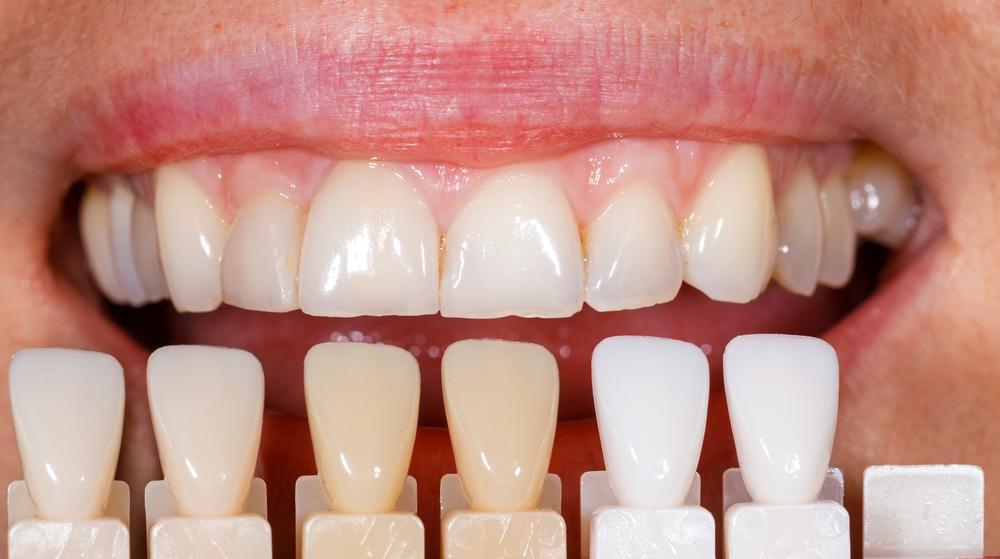Dental Veneers in Monroe MI | Pinnacle Dental Group – Perfect Your Smile
![shutterstock_512529712[1]](https://www.pinnacledentalgroupmi.com/wp-content/uploads/2019/05/shutterstock_5125297121.jpg)
What are Veneers?
Veneers are custom made, thin shells made of plastic or porcelain used to fix gaps between teeth and improve badly stained or mishaped teeth. This cosmetic dentistry procedure can dramatically improve your smile in just a few visits.
Veneers fit over the front surface of your teeth to improve their appearance. They can help correct a range of cosmetic issues, including stained or discolored teeth, crooked or misaligned teeth, chipped or broken teeth, and even minor gaps between your teeth. With veneers, you get results that look and feel completely natural. Unlike other cosmetic dental treatments like braces or crowns, veneers won’t require any changes to your underlying tooth structure. And veneers don’t require any special maintenance beyond regular brushing and flossing, making them a quick, easy, and effective way to get the beautiful smile you’ve always wanted.
Just remember: what celebrities have in common – a perfect smile and good dentition! This is why there is always something outstanding about a celebrity smiling into the camera. However, while it seems otherwise, anyone—just about anyone—can also get the celebrity smile. This doesn’t have to be a pipe dream, as there are now various means through which you can straighten your teeth. One of the improved ways of straightening and repairing your teeth is through the use of veneers. Veneers might sound new, but this method has been around since the 1980s; however, we are witnessing a comeback—a new, improved line of veneers that are designed to give you nothing short of the best.
So if you’re looking for a fast, simple way to achieve the perfect dentition, veneers may be just what you need. Our dentists at Pinnacle Dental Group are highly skilled in placing veneers so you can be confident of achieving the results you want. To find out more, feel free to book an appointment with us today!
How can veneers improve my smile?
- Close gaps between teeth
- Improve the appearance of chipped or cracked teeth
- Whiten teeth that are badly stained or discolored
- Prevent further damage to teeth
Who Are Veneers Most Suitable For?
Veneers may be an ideal solution for a variety of dental issues, including crooked or uneven teeth, gaps between teeth, and even minor tooth decay. They can also help protect your teeth from further damage caused by plaque buildup or food particles getting stuck in between your teeth.
If you are looking for long-lasting results that will improve the appearance of your smile with minimal effort on your part, then veneers may be right for you. However, it is important to consult with a dentist before making any decisions about whether veneers are the right option for you. So if you are considering using veneers to enhance your smile, contact us today and find out more about what this treatment option can offer you.
If you’d like to learn more or schedule a consultation, fill out the form below and someone from our team will be in touch.
What to expect from a dental veneer procedure
Dental veneers will usually take two appointments to properly place. Our dentists will remove any decay or tooth tissue, as well as a small amount of enamel from the tooth surface to make room for the veneer. A wax impression will then be made according to your exact specifications and be sent to a dental lab where the it is made. At your second appointment, your dentist will check the size, shape, and color of the veneer to ensure a proper fit. An adhesive will be used to bond the veneers to your teeth. We’ll use a safe, high-intensity light to harden the adhesive and create a secure bond. After the veneer is properly placed, you can expect it function like a regular tooth.
Prepping Teeth for Veneers: How to Prepare for a Veneer Installation
Getting veneers for the first time feels strange, and you might be at a loss of how to go about it, but these tips on how to get prepared for veneer installation might put you at ease. The first thing you need to do is make sure that you have a consultation with your dentist. Once you are certain about getting veneers, let the dentist know of any discomfort or oral health problem that you may be suffering from at present. Once these problems have been addressed, the process of preparing for veneer installation can begin.
The veneers will be prepared only after your dentist has performed a thorough oral examination on you. This is to make sure that there are no problems in the gums, teeth, or gums. Any issues can delay the process. When you go for this appointment, it is essential that you have all necessary records, like dental x-rays and recent photographs of your mouth, so as to expedite the process. Disclose every oral problem you have to your dentist as well. For example, if you suffer from bruxism, or the grinding of teeth at night, it can lead to considerable wear and tear in the veneers.
Diagnosis and Treatment Planning
Your dentist will check your teeth at your first visit to make sure dental veneers are a good option for you. Your dentist will also go over the procedure’s potential drawbacks and what to expect from it with you. Additionally, they might take X-rays and perhaps even imprint your mouth and teeth.
The thickness of the veneer that will be placed on the tooth surface will be about equivalent to the amount of enamel that is removed from the tooth surface to prepare it for a veneer, which is around half a millimeter. The necessity for a local anesthetic to numb the region will be discussed with you and your dentist before cutting the enamel. The next step is for your dentist to create a tooth model or impression. A dental laboratory creates your veneer using the model that was supplied to it. The veneers are typically returned to your dentist from the laboratory in 2–4 weeks. Considering that composite veneers might perhaps be completed in a single visit, this is only done for porcelain veneers.
The Veneer Installation Process
Your dentist will temporarily place the dental veneer on your tooth to check its fit and color before permanently cementing it to your tooth. In order to get the right fit, they will continuously remove and trim the veneer as needed. The color of the veneer may be changed by choosing the right color of cement. After that, your teeth will be cleansed, polished, and etched to prepare them for the veneer by roughening them up to enable a powerful bonding procedure. After coating the veneer with a specific cement, it is affixed to your tooth.
Once the dental veneer is in place on the tooth, your dentist will apply a special laser beam to solidify it rapidly by activating chemicals in the cement. After checking your bite and making any required final modifications to the veneer, any remaining cement will be removed. The location of the veneer may need to be checked again, and your dentist may request that you come back for a follow-up appointment in a few weeks to see how your gums are adapting to the veneer’s presence.
Aftercare: Taking care of your teeth after a veneer installation
When it comes to caring for your veneers, there are a few key steps that you should keep in mind. First, it is important to avoid eating very hard foods that could potentially break or chip the veneer material, as this can cause damage to your teeth and result in costly repairs.
In order to ensure that your new veneers stay secure and look their best for as long as possible, it is also important to practice good oral hygiene habits. This means brushing your teeth at least twice a day, flossing regularly, and visiting your dentist for regular cleanings every six months or so. Additionally, be sure not to brush your veneers too harshly with abrasive toothpaste, as this can quickly wear down the material and cause it to look dull and discolored over time.
Overall, caring for veneers is very similar to caring for natural teeth, and with the proper steps in mind, you can be sure to keep your smile looking healthy and beautiful for many years to come.
Why You Should Get Veneers
Veneers are popular among a lot of people as an alternative to braces or plastic surgery to get their teeth fixed. Whether you have yellowed, stained, or crooked teeth, veneers can help to conceal these cosmetic flaws and improve your appearance. They are a popular choice among people looking for a quick and affordable way to achieve a more beautiful smile.
Additionally, they can be used to correct a variety of dental issues, such as gaps between teeth and unevenly shaped or sized teeth. Overall, if you are looking for an effective, long-lasting solution to enhance the appearance of your smile, then veneers may be right for you.
Apart from the cosmetic importance of veneers, which can be achieved with minimal stress and helps to improve self-confidence and self-esteem, other things you stand to gain with veneers include:

Better Oral Health
As veneers can be used to correct a variety of dental issues, such as crooked or uneven teeth and gaps between teeth, they help improve your oral health.
Long-lasting Results
With the proper care and maintenance, the effects of veneers on your teeth can last as long as ten to fifteen years or even more.
Reduced Risk of Tooth Decay and Gum Disease
Veneers are made from durable materials that help protect your teeth from damage caused by plaque buildup or food particles getting stuck in between your teeth.
Stained teeth get a whiter makeover
Veneers are able to mask those yellow or brown spots on the fronts of your teeth that seem to never go away, no matter how many times you brush and floss.
Veneers and Braces: Which are Better?
Veneers and braces are two different cosmetic dental treatments that can be used to improve the appearance of your smile. While both treatments involve using specialized tools to change the shape or position of your teeth, they differ in a number of key ways. Veneers, which are typically made from porcelain or composite resin, are designed to correct aesthetic problems such as crooked teeth or discoloration. Braces, on the other hand, are designed to correct misaligned teeth by using a series of wires and brackets to slowly shift them into place.
While both of them might be considered to achieve similar results, people have different preferences, and sometimes your dentist might recommend one over the other based on the specific needs of your teeth.
Similarities between Veneers and Braces
In general, veneers and braces provide similar benefits when it comes to addressing common issues with your smile’s appearance, such as deviations in tooth alignment or discoloration. Both veneers and braces are used to improve the appearance of teeth by addressing aesthetic issues such as crookedness, gaps, and discoloration. And they are also generally considered safe and effective treatments when performed by a qualified dentist or orthodontist.
Differences between Veneers and Braces
Veneers are typically made from porcelain or composite resin, materials that are nearly indistinguishable from the natural enamel of your teeth when placed over them. Braces, on the other hand, use a series of wires and brackets to slowly shift your teeth into their desired position as they grow and mature.
Because veneers require a bit more work than simply putting braces on your teeth, they generally cost slightly more. If you’re looking for a fast fix for cosmetic issues with your smile, then veneers might be right for you. If you prefer gradual changes and taking time to let your teeth adapt to shifts in their positioning, however, then braces may be a better option. Ultimately, the choice is up to you and what works best for your overall dental health.
Braces are usually made of metal, though clear versions exist as well. They use small metal brackets and wires to gradually shift teeth over time as they grow. Veneers, on the other hand, are customized sheets of material that fit directly over your actual teeth in order to fix imperfections. In most cases, veneers can even be placed over existing braces if necessary.
Veneers can be applied in a single visit to the dentist’s office, whereas traditional metal braces require several appointments for adjustments over several months. This makes veneers a more convenient option if you need immediate results.
Another major difference between braces and veneers is that veneers are generally less painful to get than braces. While braces typically require some degree of discomfort throughout the treatment process, veneers can usually be applied with little to no pain or discomfort on the part of the patient.
Which is Costlier: Veneers or braces?
There is no definitive answer to this question, as the cost of both veneers and braces can vary depending on a number of factors. Typically, veneers tend to be slightly more expensive than braces, as they typically require more in-depth treatment and materials. However, this will ultimately depend on your specific situation, so it’s best to consult with your dentist to get a more accurate estimate for either option.
Choosing the Right Treatment
Braces certainly have a longer track record than veneers when it comes to straightening teeth; however, with advances in technology, cosmetic dentists now have a number of options available for how to treat teeth and create a more pleasing look. They’re often considered the most effective treatment for addressing crooked or misaligned teeth—and can even be used in combination with veneers to get even more dramatic results.
When it comes down to a solution that is more effective for closing the gaps between your teeth and similar problems, then veneers are best suited for you. Most times, the problem you have determines which method is best for you, so if you are considering getting either veneers or braces for improving your smile, it is important to discuss both options with your dentist and go over the pros and cons of each. Doing so will help you make an informed decision based on your specific dental needs, goals, budget, general comfort level with treatments, etc.
But How Do Veneers Work?
Veneers work by covering up the look of teeth that are crooked, malformed, or discolored. They may also make little gaps in your teeth look less noticeable. There is a range of options to choose from as regards installing veneers; they can be installed on one tooth, a couple of teeth, or the entire set of teeth. In the end, the ultimate function of veneers is to make your perfect smile appear.
Types of Veneers
There are several different types of veneers available, each with their own unique benefits and drawbacks.
Porcelain Veneers
Unarguably, porcelain veneers are the most common solution for people seeking a perfect smile. Its exceptional resistance and the ability to mirror the sheen of healthy teeth naturally are two of the strongest points of porcelain veneers. Porcelain veneers offer a highly durable and aesthetically pleasing solution to cosmetic dental problems like discoloration, cracks or chips in the teeth, and spacing issues. These ultra-thin shells, which are custom-made to fit over the front surface of your teeth, are also exceedingly biocompatible, so they are less likely to cause harm to the soft tissues around the gum line and in your mouth.
Benefits of Porcelain Veneers
- Porcelain veneers have the ability to mimic the brilliant, transparent look of the natural teeth and their smooth feel.
- With the right care and treatment, porcelain veneers might even last up to fifteen years.
- They’re strong since they’re built of sturdy materials; therefore, it is extremely unlikely that teeth may shatter or chip.
Cons of Porcelain Veneers
- Once started, the process is irreversible, mainly because of the way it is installed. Before installing veneers, a layer of enamel must be removed in order to insert the veneers.
- Porcelain veneers can be considered more expensive than other types of veneers.
- Removing the enamel of your teeth comes with some consequences, one of which is tooth sensitivity, especially when you consume something hot or cold, especially for a few days following your treatment. There are, however, over-the-counter treatments that can help you control this tooth sensitivity, which can be painful and bothersome.
Composite Veneers
Composite resin veneers are another popular option for enhancing the appearance of your teeth. Made from a type of tooth-colored resin material, composite resin veneers are bonded directly to the front surface of your teeth and can usually be completed in a single office visit.
Benefits of Composite Veneers
- Composite veneers are less costly than porcelain veneers, and as such, they might be a preferred option because of their reduced price.
- Installing a composite resin veneer requires less time than porcelain and can be done in only one clinic visit.
- They only need a smaller amount of enamel removal, making them less invasive and much less likely to cause damage to your gum tissue.
- Just like porcelain, they can conceal stained teeth, misaligned teeth, and other cosmetic issues.
Cons of Composite veneers
- When compared to porcelain veneers, composite veneers are not necessarily more durable. However, they might be able to endure five to seven years if proper care is taken of them.
- Composite veneers are often made of softer materials that are more susceptible to chips and cracks.
- In comparison to porcelain veneers, they need to be changed or fixed more frequently and are easier to stain than other types of veneers.
Cost of Veneers in Michigan
Generally speaking, you can expect to pay anywhere from a few hundred dollars up to a few thousand dollars for a veneer installation. One thing to keep in mind when considering the cost of veneers is that they are generally considered a long-term investment. Unlike other cosmetic procedures like teeth whitening or teeth straightening, which may only last for a few months or years before needing to be repeated, most patients find that their veneers last for many years without any significant wear or repair needed.
The other cost to consider is that of any additional procedures you may need in order to prepare your teeth for the veneers. Since most patients do not have perfectly straight and evenly-sized teeth, this often involves a bit of reshaping and contouring before their dental practice can apply the custom veneers. If you are considering getting veneers, it’s important to speak with your dentist about all potential costs so that you can make an informed decision.
There are several factors that come into play when the cost of veneers is considered, including:
- The Veneer Used
- The Quantity of Veneers
- Location where procedure occurs
- Dentist Fee
We discuss these factors in detail in our extensive discussion on the cost of veneers in Michigan.
Useful Reading
Prepping For Veneers
Read tips on preparing for dental veneer installation.
Composite Veneers
Read more on composite veneers, selection considerations and cost.
Porcelain Veneers
Read more on porcelain veneers, selection considerations and cost.
Veneers Vs Crowns
Veneers or Crowns – How do they compare and which is right for you?
Veneers Vs Implants
Veneers or Implants – How do they compare and which is right for you?
Frequently Asked Questions
How long do veneers take to work?
Depending on the type and extent of your veneers, they may take several weeks or even months to fully integrate into your teeth and produce the desired results. However, most patients find that their veneers begin to work almost immediately and become more effective over time.
Do veneers hurt?
Some patients experience some minor discomfort or sensitivity after getting veneers, but this usually subsides within a few days. This is most often less painful than getting dental fillings or other types of traditional dental work. If you are concerned about the possible pain associated with veneers, talk to your dentist about your specific treatment plan. He or she can help you understand what to expect and how to manage any discomfort that may occur during or after treatment.
Can you install veneers by yourself?
While some DIY veneer kits are available, it is generally not recommended that you install veneers on your own. Veneers are a specialized and technically difficult procedure that should be performed by an experienced dentist.
Does insurance cover veneer installation?
Many insurance companies do not cover the cost of veneer installation as it is considered a cosmetic procedure. However, if you have dental insurance, you may be able to use your coverage to help cover the cost of veneers in some cases. To find out if you are eligible for coverage, you will need to contact your insurance provider directly and ask about their specific policies regarding veneer installation.
How long does it take to install veneers?
The process of installing veneers typically takes several appointments at the dentist’s office, as it is a highly specialized and technically challenging procedure. However, each appointment is typically brief, so the total amount of time you will need to invest in your veneers’ installation is usually less than a week.
Are veneers permanent?
Veneers are not considered to be a permanent dental procedure, and they may need to be replaced or re-cemented over time as your teeth continue to shift and move. However, with proper care and maintenance, veneers can last for many years and are a popular choice for those looking for a quick and effective way to improve the appearance of their teeth. our own. Veneers are a specialized and technically difficult procedure that should be performed by an experienced dentist.





